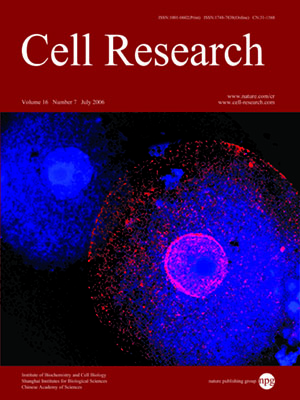
Advanced Search
Submit Manuscript
Advanced Search
Submit Manuscript
Volume 16, No 7, Jul 2006
ISSN: 1001-0602
EISSN: 1748-7838 2018
impact factor 17.848*
(Clarivate Analytics, 2019)
Volume 16 Issue 7, July 2006: 609-609
Dangsheng Li
Cell Research, Shanghai Institutes for Biological Sciences, Chinese Academy of Sciences, 319 Yueyang Road, Shanghai 200031,China Correspondence: Ovarian cancer is one of the most lethal malignancies in women. Identification of new therapeutic targets would provide
opportunities for developing potentially more effective treatment regimes. In the July issue of Cell Research, Cao et al.
reports that glycogen synthase kinase-3β (GSK-3β) plays an important role in positively regulating the proliferation of
human ovarian cancer cells, and thus it may represent such a target [1]. GSK-3β is a serine/threonine kinase that is known
to be involved in regulation of β-catenin signaling, where it participates in the formation of a multi-component destruction
complex that promotes the phosphorylation and subsequent degradation of β-catenin. Given that overactive β-catenin
signaling is involved in many forms of human cancer, this classic mode of GSK-3β action should qualify it as a “tumor
suppressor”. Intriguingly, however, two recent studies have implicated that GSK-3β may actually play a pro-tumor role
in pancreatic and colorectal cancers [2, 3]. Since ovarian tumors often exhibit increased expression of GSK-3β, these
recent findings prompted Cao et al. to examine the potential role of GSK-3β in ovarian cancer cells.
The authors chose the human ovarian cancer cell line SKOV3 as their main model system, since a preliminary analysis
showed that SKOV3 cells appear to express more active form of GSK-3β than another examined cell line. As a first
test, they treated ovarian cancer cells with two different pharmacological inhibitors of GSK-3β, LiCl and SB216763,
and found that both inhibitors significantly reduced growth of these cells in culture. To further probe its role, Cao et al.
introduced a constitutively active form of GSK-3β into SKOV3 cells and analyzed these cells for proliferation and colony
formation. Their results showed that cells expressing the constitutively active GSK-3β exhibited higher proliferation and
formed significantly more colonies than control cells. In contrast, proliferation and colony formation were inhibited in
cells receiving a peptide inhibitor of GSK-3β. To gain insight into the underlying mechanism, the authors performed cell
cycle analysis, and found that cells expressing the constitutively active GSK-3β had an increased S-phase population and
a higher level of cyclin D1 expression, while the opposite was true for cells receiving the peptide inhibitor. These results
suggest that GSK-3β may function to promote cell cycle progression in ovarian cancer cells. The authors then used nude
mice harboring cancer xenograft generated from SKOV3 cells to test the role of GSK-3β in vivo. Encouragingly, treatment
with the GSK-3β inhibitor LiCl resulted in a significant reduction in both tumor volume and tumor weight in these mice.
Although the detailed molecular mechanism remains to be elucidated, the study by Cao et al. clearly suggests that GSK-
3β is a positive regulator of cell proliferation and tumor growth in ovarian cancer. Strategies targeting this kinase (or in
combination with other therapeutic measures) may lead to more effective treatment of this deadly disease in the future.
References
1 Cao Q, Lu X, Feng YJ. Glycogen synthase kinase-3β positively regulates the proliferation of human ovarian cancer cells. Cell Res 2006;
16:671-677.
2 Ougolkov AV, Fernandez-Zapico ME, Savoy DN, Urrutia RA, Billadeau DD. Glycogen synthase kinase-3β participates in nuclear factor
κB-mediated gene transcription and cell survival in pancreatic cancer cells. Cancer Res 2005; 65:2076-2081.
3 Shakoori A, Ougolkov AV, Yu ZW, et al. Deregulated GSK3β activity in colorectal cancer: its association with tumor cell survival and
proliferation. Biochem Biophys Res Commun 2005; 334:1365-1373.
Cell Research (2006) 16:609. doi:10.1038/sj.cr.7310082; published online 17 Jul 2006